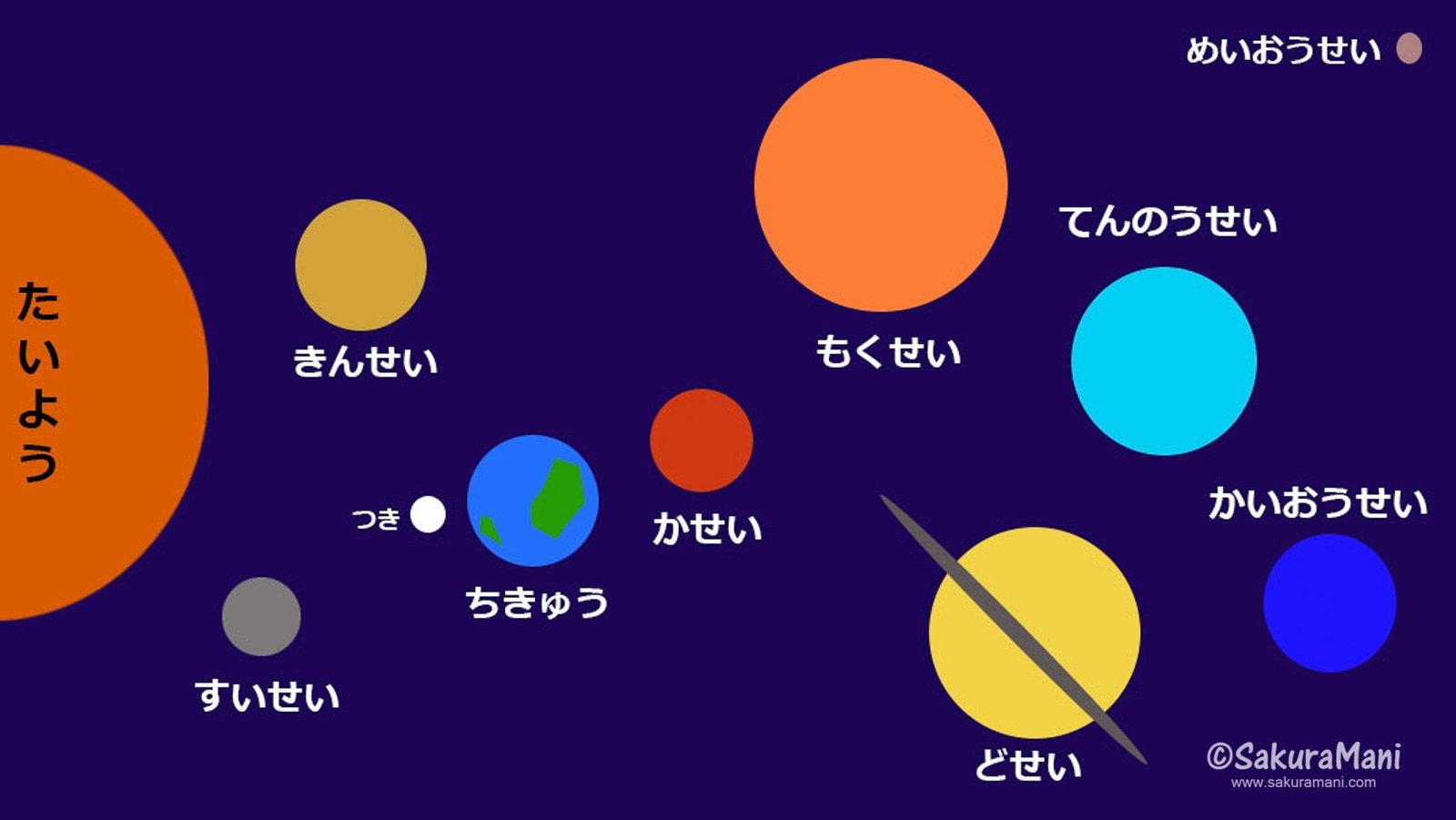If you have started learning Japanese, you might have heard by now that there were no written scripts in Japan until Kanji were introduced from China. In early Japan, people only communicated verbally and once kanji were introduced in the 5th century, chronicles, stories and poems emerged in the written form. Soon Hiragana and Katakana scripts […]
Japanese Lessons
The Solar System in Japanese
The Japanese names of the planets as well the days of the week are 漢語 kango or words of Chinese origin. Learn how to say the days of the week in Japanese from my previous lesson Dates and Days in Japanese.
5 Useful Japanese Expressions
In my post about ‘aizuchi‘, I mentioned about five useful interjections that are used as filler responses during any conversation. Today, I would like to introduce five more useful words that will help you during conversations. These words complement one’s response and convey their feelings. ちょっと Literally chotto means little. Like in, ちょっと待ってください (chotto matte […]
JLPT N1 Kanji Lesson 5
呈 present, exhibit, display 音読み:テイ 例:進呈(しんてい presentation)、贈呈(ぞうてい to gift)、露呈(ろてい disclose) 皇 emperor 音読み:オウ・コウ 例:皇居(こうきょ the imperial palace)、皇后(こうごう empress)、天皇(てんおう emperor)、皇室(こうしつ imperial family)、皇太子(こうたいし crown prince)、皇太子妃(こうたいしひ crown princess) 狂 crazy, go out of order 訓読み:くるう・くるおしい 音読み:キョウ 例:狂言(きょうげん comical Noh drama)、狂詩曲(きょうしきょく rhapsody) 班 team, party, group 音読み:ハン 例:OO班(OOはん oo team)、作業班(さぎょうはん work team)、班長(はんちょう team leader) 廷 government office, […]
Non-English Katakana Words
In my previous lesson about Katakana, I listed down five situations when Katakana script is used over Hiragana or Kanji. In this post I would like to share some facts about 外来語 gairaigo. Katakana is mainly used when writing loanwords or 外来語 gairaigo like スピーチ (speech)、トマト (tomato) or パーティー (party) in Japanese. All these words are […]
When to use Katakana?
Japanese language has three different scripts – Kanji 漢字, Hiragana ひらがな and Katakana カタカナ. There were no written scripts in Japanese, until Hanzi characters were introduced from China. These Chinese logograms became a part of the Japanese writing system, however words like prepositions, suffixes, prefixes and verb conjugations could not be represented by Kanji. Hence, […]
JLPT N1 Kanji Lesson 4
攻 attack, assault 訓読み:せめる 音読み:コウ 例:攻撃(こうげき attack)、専攻(せんこう specialisation)、侵攻(しんこう invasion) 牧 care for, shepherd 訓読み:まき 音読み:ボク 例:牧師(ぼくし pastor)、牧場・牧場(ぼくじょう・まきば grazing land) 倣 imitate, emulate 訓読み:ならう 音読み:ホウ 例:模倣(もほう copying) 敢 daring, pitiful 訓読み:あえて 音読み:カン 例: 勇敢(ゆうかん brave)、敢行(かんこう decisive action) 敵 enemy, opponent 訓読み:あだ 音読み:てき 例:強敵(きょうてき formidable enemy)、素敵(すてき superb)、匹敵(ひってき comparable)、油断大敵(ゆだんたいてき overconfidence is the biggest enemy) 徹 clear, […]
JLPT N1 Kanji Lesson 3
項 item, clause, back of the neck 訓読み:うなじ 音読み:コウ 例: 項目(こうもく data/entries)、事項(じこう item/fact) 頑 stubborn, firm 訓読み:かたく 音読み:ガン 例: 頑固(がんこ stubborn)、頑張る(がんばる do one’s best) 煩 troublesome, annoying 訓読み:わずらわしい 音読み:ハン・ボン 例: 煩わしい(わずらわしい troublesome)、煩う(わずらう to worry about)、煩雑(はんざつ intricate)、煩悶(はんもん worry) 頻 repeatedly 訓読み:しきりに 音読み:ヒン 例: 頻度(ひんど frequency)、頻繁(ひんぱん frequently)、頻発(ひんぱつ frequent occurrence)、頻々(ひんぴん often) 顕 appear, existing 訓読み:あらわれる 音読み:ケン 例: 顕微鏡(けんびきょう microscope)、顕著(けんちょ remarkable) […]
JLPT N1 Kanji Lesson 2
貢 support, contribute 訓読み:みつぐ 音読み:ク・コウ 例:貢献 (こうけん contribution) 賀 felicitations, joy 音読み:ガ 例: 年賀状(ねんがじょう new year’s greeting card)、祝賀(しゅくが celebration)、謹賀新年(きんがしんねん Happy New Year formal written expression) 貴 precious, esteem 訓読み:とうとい 音読み:キ 例: 貴い(とうとい precious)、貴社(きしゃ your company)、貴重(きちょう valuable) 漬 to soak, to dip in 訓読み:つける 音読み:シ 例: 漬物(つけもの pickled vegetables) 賓 V.I.P, guest […]
JLPT N1 Kanji Lesson 1
盆 o-bon, lantern festival, tray 音読み:ボン 例:盆栽(ぼんさい bonsai)、盆地(ぼんち basin)、盆踊り(ぼんおどり folk dance during bon festival) 益 profit, gain 訓読み:ます・よう 音読み:エキ・ヤク 例:利益(りえき profit)、収益(しゅうえき earnings)、差益(さえき marginal profit) 盛 prosper, boom 訓読み:さかん・もる・さかる 音読み:ジョウ・セイ 例:盛ん(さかん prosperous)、盛り(さかり peak)、盛る(もる serve food, fill up)、盛大(せいだい grand, magnificent)、繁盛(はんじょう thriving) 盤 shallow bowl 音読み:バン 例:基盤(きばん base)、地盤(じばん ground)、地盤沈下(じばんちんか land subsidence)、碁盤(ごばん go board) […]

